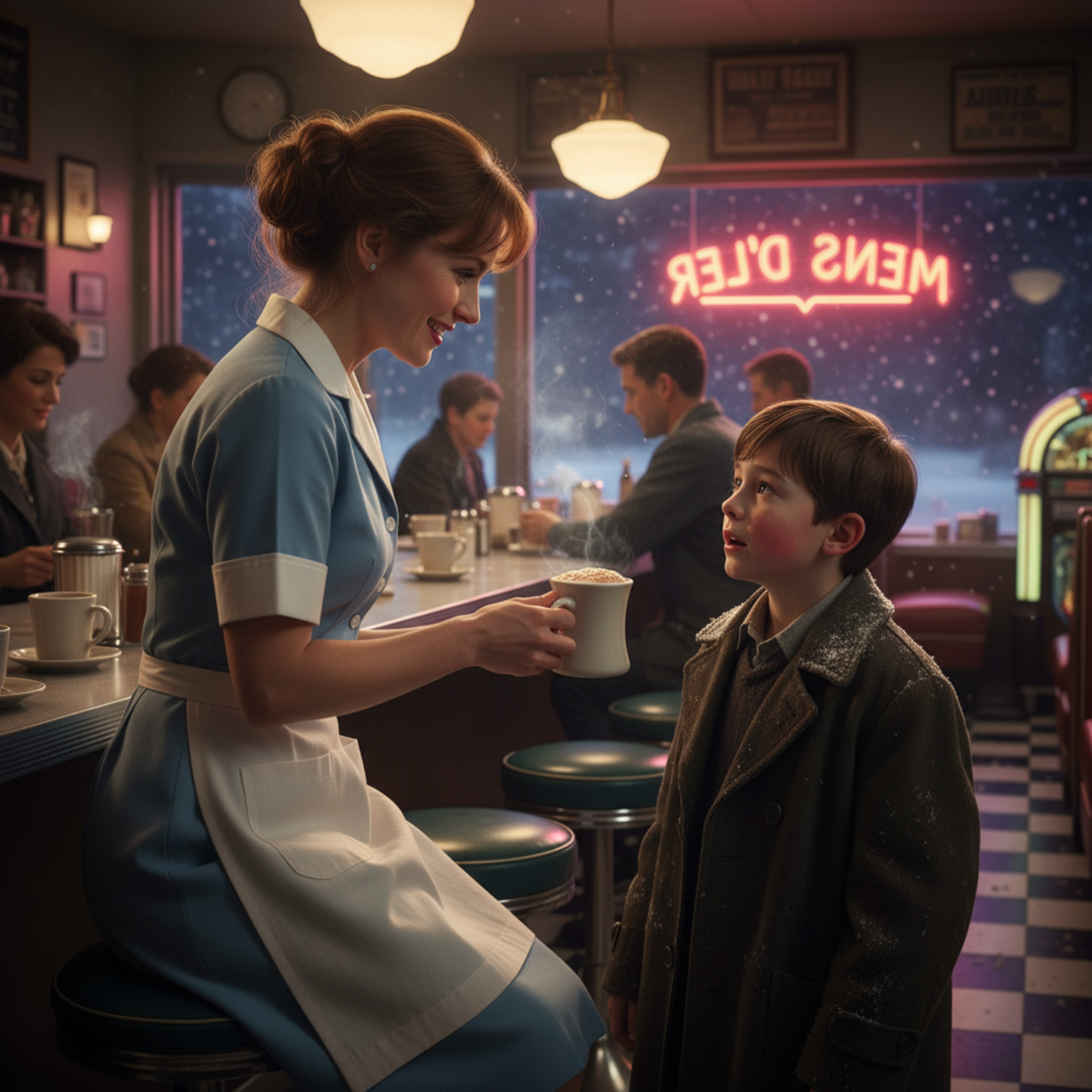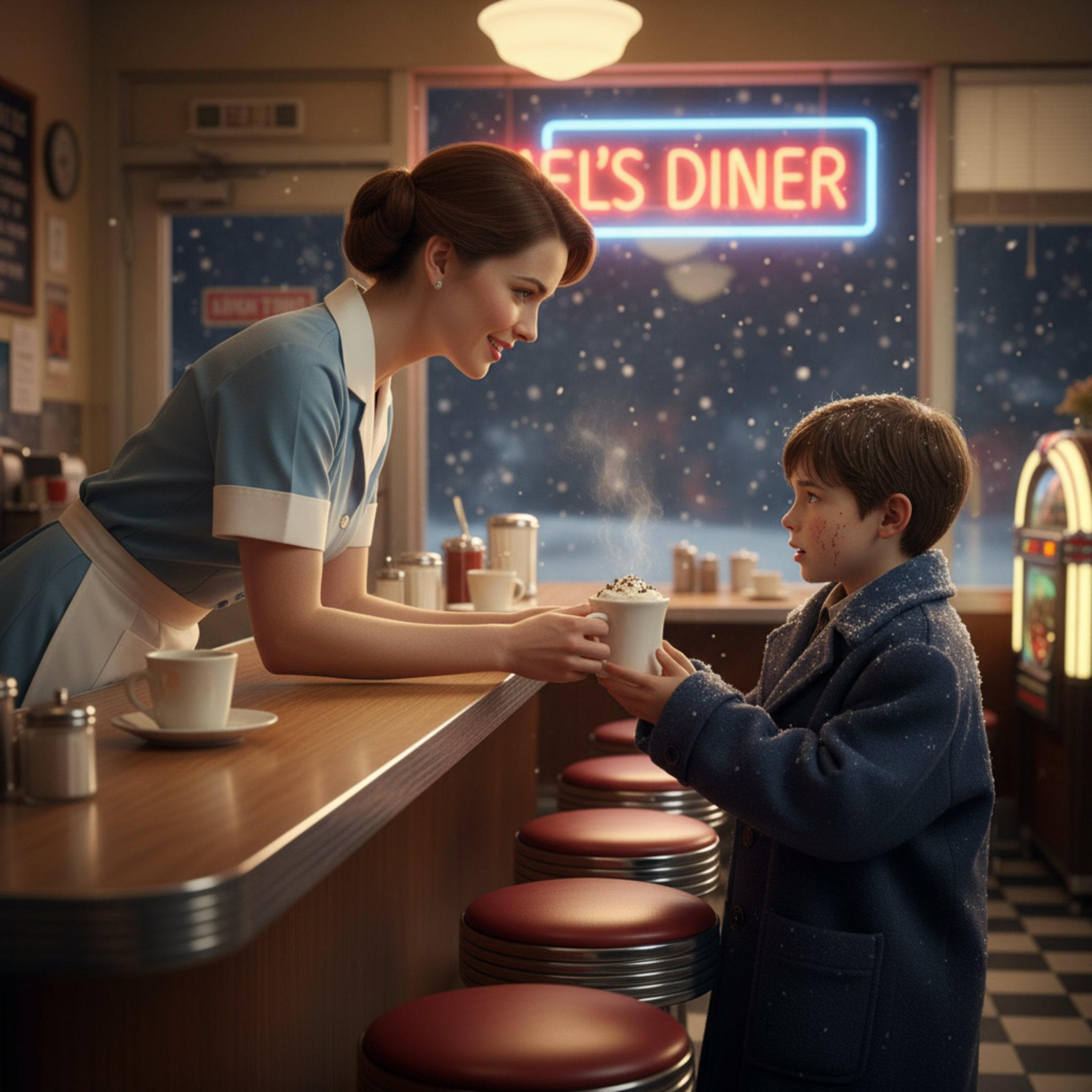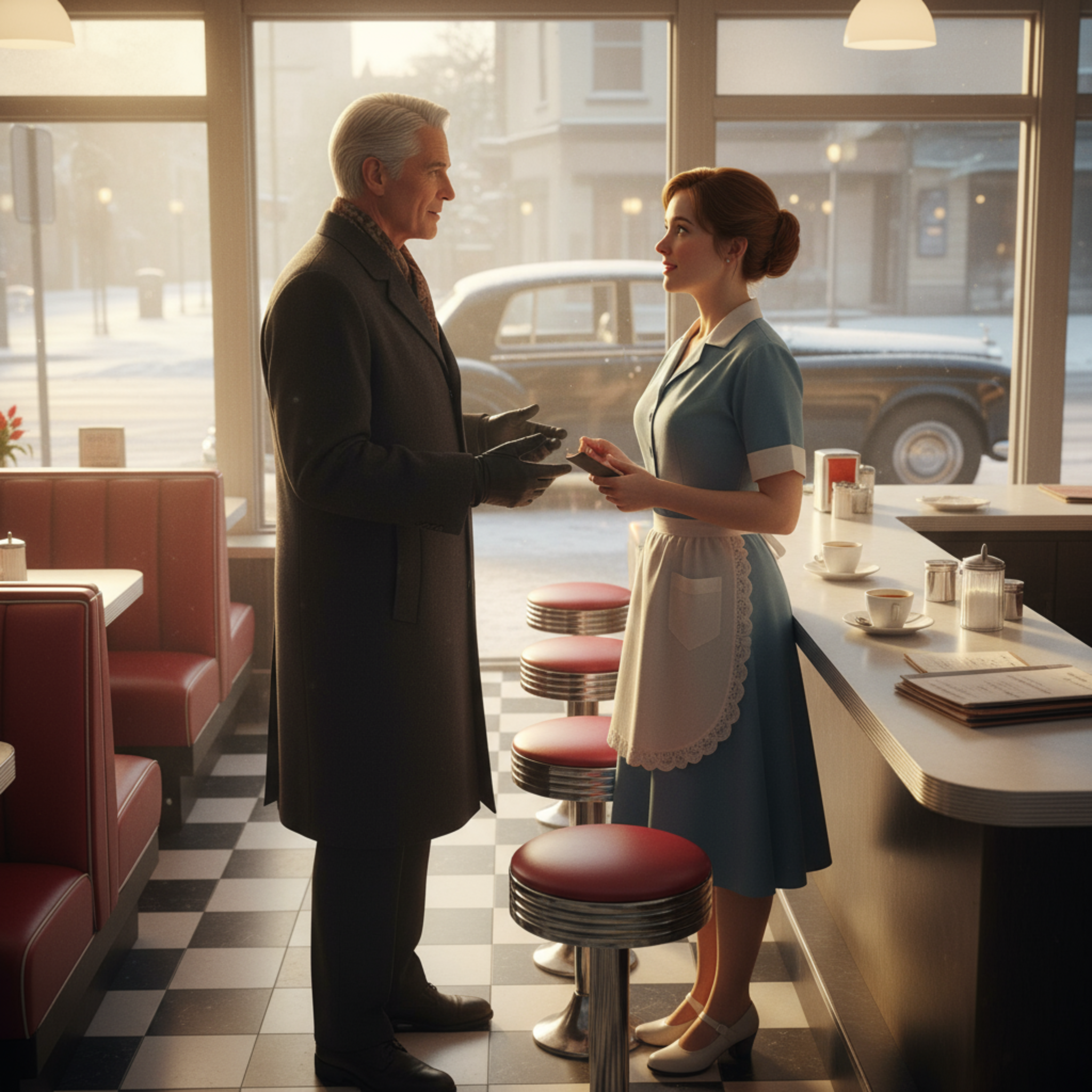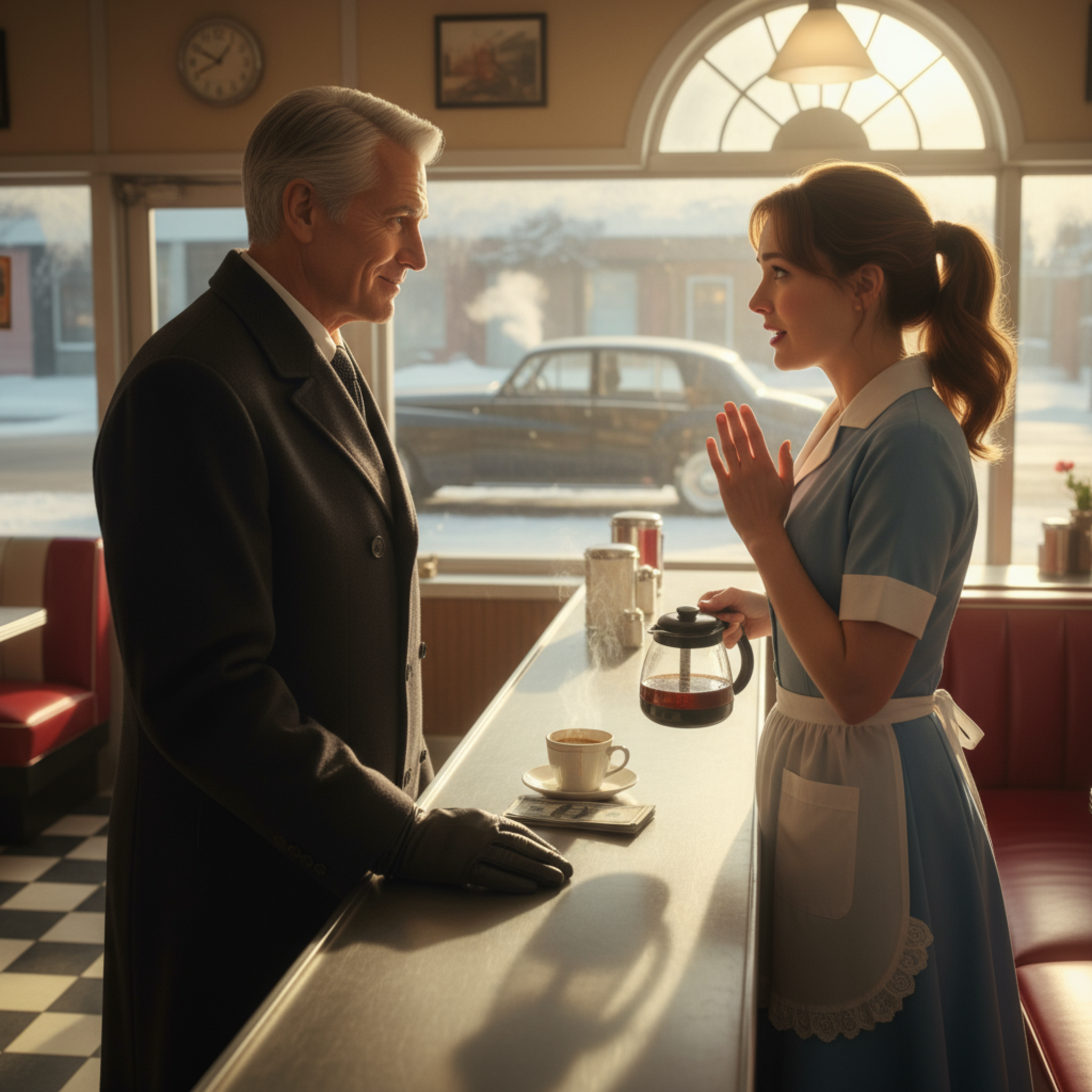It was one of those bitterly cold nights that made the neon lights outside the diner flicker like dying stars. The streets of downtown Boston were almost empty, blanketed in frost, and the hum of the heater inside Mel’s Diner was the only comforting sound.
I was finishing my night shift—my eighth consecutive one—wiping down tables that no one had sat at for hours. It was past midnight when the bell above the door jingled softly.

A boy—maybe ten, maybe twelve—stood there, his hair damp from snow, his coat two sizes too big. His cheeks were red, his hands trembling. He hovered at the door, unsure whether to come in or not.
“Hey, sweetheart,” I called gently. “You’re freezing. Come sit down.”
He hesitated, glancing around the empty diner like he didn’t belong. Then he slipped into a booth near the window.
I poured him a cup of hot chocolate, the way my mom used to when I was little—extra whipped cream and a drizzle of chocolate syrup.
When I set it down, he whispered, “I don’t have any money.”
“That’s okay,” I said with a smile. “You can pay me back someday. Maybe with a story.”
He looked up, startled, as if no one had ever said that to him before.
I brought him a plate of pancakes, eggs, and bacon—our ‘Winter Warmer’ special. He devoured it in silence, pausing only to murmur, “Thank you, ma’am.”

While he ate, I pretended to clean nearby, but I was really watching him. There was something about the way he clutched the fork—like he was afraid someone might take it from him—that broke my heart.
After a while, I asked softly, “Where’s home, honey?”
He lowered his gaze. “Don’t have one right now. My mom’s… sick. She’s at the hospital. I just… needed to be somewhere warm.”
I bit the inside of my cheek, trying not to cry. “You can stay here as long as you need,” I said. “It’s warm, and you’re safe.”
He nodded, then slowly rested his head on the booth. Within minutes, he was asleep—his small body curled up like a kitten.
I took off my scarf, gently draped it over him, and whispered, “Sleep well, kiddo.”
When the morning light crept through the blinds, I expected to wake the boy and maybe call a social worker. But instead, I found something that froze me in place.
The booth was empty. My scarf was folded neatly on the table. Beside it was a note written in careful, slanted handwriting:
“Thank you for being kind when no one else was. I’ll never forget this. – L.”
I sighed, half relieved, half worried. Maybe he’d gone back to the hospital. Maybe he’d be okay.
But that wasn’t the end. Not by a long shot.

Later that morning, just as I was clocking out, a black Rolls-Royce pulled up outside the diner. I thought it was a mistake—this wasn’t the kind of place where luxury cars stopped.
A tall man in a dark overcoat stepped out. His silver hair caught the winter light, and his eyes were sharp but kind. Everyone in Boston knew his face—Leonard Hale, the city’s quietest billionaire. He rarely appeared in public, but when he did, headlines followed.
I froze, dish rag still in hand.
He walked in, looked around the diner, and said, “Are you Miss Julia Evans?”
My heart skipped. “Yes, sir.”
He nodded once. “You were working last night?”
“Yes.”
He placed a gloved hand on the counter and said quietly, “You served a boy here. Around midnight?”
I blinked. “Yes, I did. Is he… okay?”
His lips trembled just slightly before he steadied his voice. “That boy is my grandson.”

The room went silent.
He went on, “His mother—my daughter—has been in the hospital for weeks. The boy got lost on his way to visit her. When we couldn’t find him last night, we alerted the police.” He paused, glancing around the diner. “They traced his steps here.”
I felt my knees weaken. “Oh, thank goodness he’s safe.”
Mr. Hale studied me for a moment, his eyes softening. “He told me what you did for him. You didn’t treat him like a nuisance or a charity case. You gave him warmth… dignity.”
“I just did what anyone should do,” I murmured.
He shook his head. “No, Miss Evans. Most people wouldn’t.”
He pulled out a small envelope from his coat pocket and placed it gently on the counter. “Consider this an offer. Not charity—an opportunity.”
Inside was a card embossed with gold letters: Hale Foundation for Community Outreach. Beneath it, in careful script, it read:
Position: Outreach Coordinator
Salary: $95,000 per year
Location: Boston Headquarters
I stared, unable to breathe. “There must be some mistake—”
He interrupted softly, “No mistake. You showed the kind of heart this world needs. My foundation helps families in crisis. People like my daughter… like that boy. We need people who understand compassion the way you do.”
Tears welled in my eyes. “Mr. Hale, I don’t even have a college degree—”
“Compassion,” he said, “doesn’t require one.”

A week later, I stood inside the glass tower of Hale Industries, staring out at the snow-covered city below. My hands still smelled faintly of coffee and pancake syrup, but I didn’t mind.
In the lobby, there was a framed photograph of Mr. Hale with his grandson—the same boy who’d sat in my booth, shivering. He was smiling now, holding a mug of hot chocolate.
And below the photo, a plaque read:
In honor of Julia Evans, whose kindness reminded us that the smallest acts can change the world.
That night, I went back to the diner, just to sit in that same booth for a moment. The old neon lights flickered as always, but to me, the place looked different—warmer somehow.
A young waitress came over and asked, “Coffee, ma’am?”
I smiled. “Yes, please. And maybe add some whipped cream on top. Just like I used to make.”
She laughed, not knowing the story behind those words. But I did.
Because sometimes, all it takes is one plate of pancakes, one act of kindness, to change everything—
For a boy lost in the cold.
For a billionaire searching for humanity.
And for a tired waitress who never thought she’d be seen.